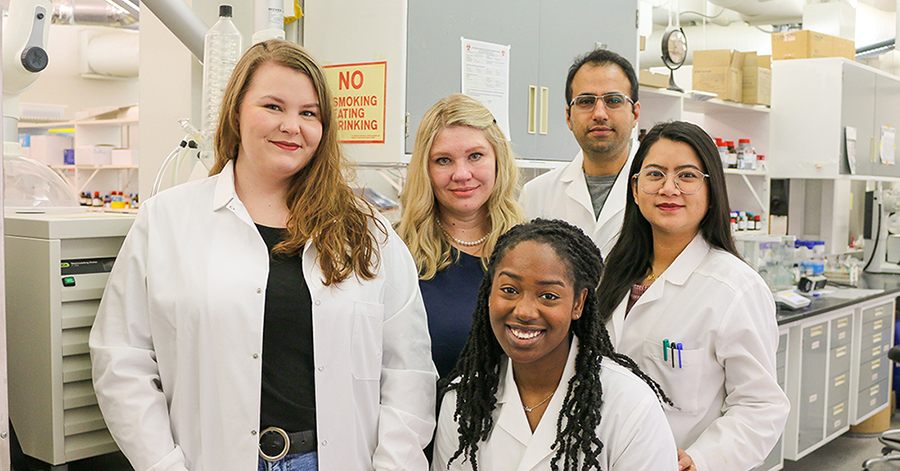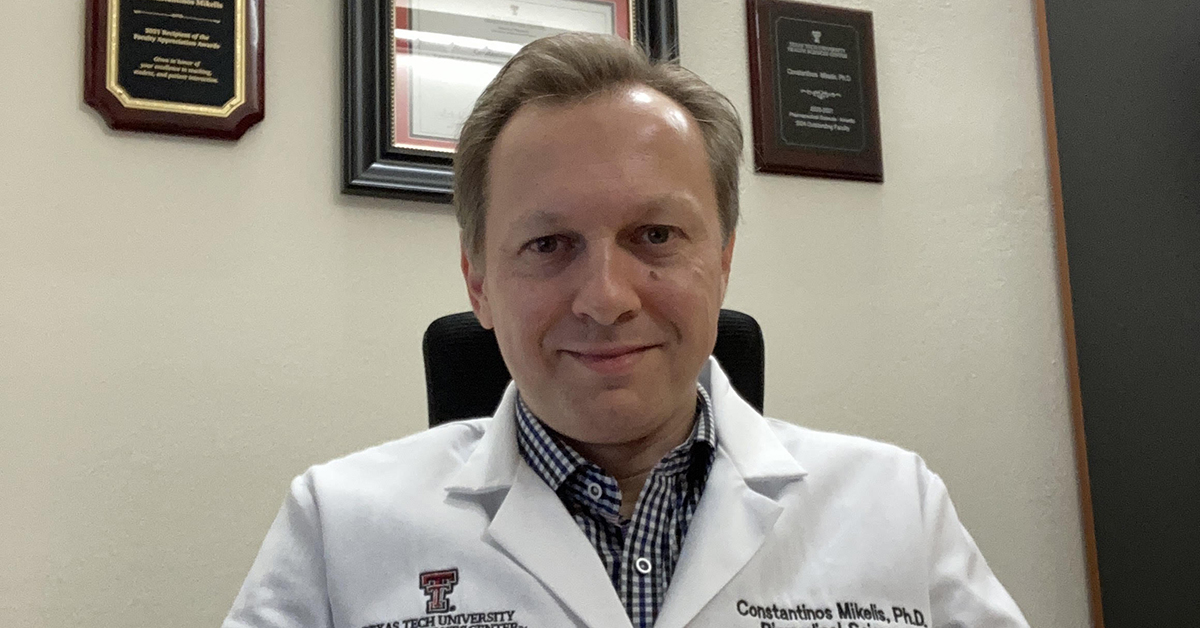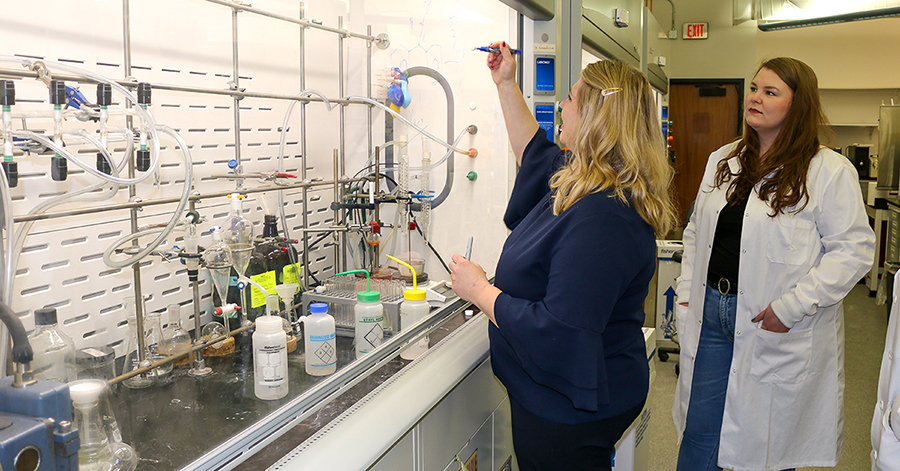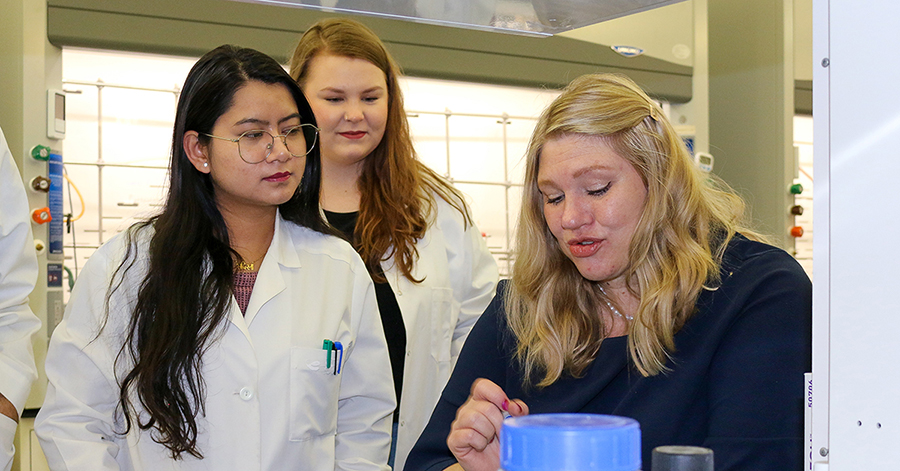Pharmacy Researchers Receive Patent for Chemical Probe
Molecule to Target Brain’s Dopamine Transporter

Dr. German and her team
Many brain diseases and disorders lead to neuroinflammation, a swelling of brain tissue that is increasingly recognized as one of the telltale signs and disease progression factors of Alzheimer's and Parkinson's disease. Neuroinflammation can limit blood flow to areas in the brain, which can lead to the inhibition of the body's natural disease fighting mechanisms.
Traumatic brain injuries also cause significant neuroinflammation. In fact, unresolved and severe brain edema (swelling caused by trapped fluid) is the leading cause of death for traumatic brain injury patients within the first few days of injury.
Because neuroinflammation has been linked to dopaminergic signaling, Nadia German, Ph.D., director of the Medicinal Chemistry program at the Texas Tech University Health Sciences Center (TTUHSC) Jerry H. Hodge School of Pharmacy, said there is increasing interest in determining whether the modulation of dopamine levels at the inflammation site can stop or even reverse neurodegeneration.

Nadia German, Ph.D.
To help make that determination, German and collaborator Constantinos Mikelis, Ph.D., adjunct associate professor in the TTUHSC Department of Pharmaceutical Sciences, have received a U.S. patent for a chemical that targets the brain’s dopamine transporter. Affecting the dopamine transporter is one of the ways by which dopamine levels in the brain can be controlled.
In addition to Alzheimer’s disease, Parkinson’s disease and traumatic brain injuries, German said there are other central nervous system disorders, such as glioblastomas (brain tumor) and multiple sclerosis, that also exhibit dopamine-related neuroinflammation, and that could potentially benefit from the newly patented chemical probe.
“Low levels of dopamine can result in neuroinflammation, neuron death and other non-pleasant effects,” German said. “At the same time, neuroinflammation causes reduction in the expression of dopamine neurons, creating a vicious cycle of cause and effect. By controlling the dopamine levels, we can try to stop this cycle.

Constantinos Mikelis, Ph.D.
“The specific component we have patented has really great selectivity for the dopamine transporter. It does have some activity at another transporter that regulates the neurotransmitter serotonin, but its affinity to the dopamine transporter is higher — by one hundred-fold — so it's really, really selective.”
The Mikelis lab evaluated the different activities displayed by the patented molecule in relation to the various receptors. He also investigated the pharmacokinetic profile of the molecule to ensure it actually reaches the brain at levels that are beneficial to the patient.
“We used in vitro (outside a living organism; e.g., test tube, culture dish) and in vivo (in a living organism) models, and we tested different molecules to identify the best possible parameters and to select the molecule that we finally patented,” Mikelis added.
German and Mikelis patented the molecule as a chemical scaffold, a process that adds desired bioactive properties to the core structure of the molecule.
“Together with our very supportive collaborators Dr. Volker Neugebauer and Dr. Mirla Avila, we just recently published a paper in the journal ACS Chemical Neuroscience where we talk about this,” German said. “To our best knowledge, we are the first to show that dopamine transporter inhibitors reduce levels of neuroinflammation in multiple sclerosis models (mice) at the same level or better than the corticosteroids that we use now.”

Dr. German with her team
Though the testing and evaluation that led to the patent demonstrated that the specific activity of the molecule has a strong therapeutic potential, it still must pass through several stages of development and approvals before it can become a market-ready drug.
“It will take some time, I'm sure, but in the end, I'm also sure we will be able to get a molecule with a good drug-likeness profile,” German said. “The gold standard, of course, is oral dosing, but if not, there are many systems we can use for the delivery of the drug.”
German and Mikelis partnered early on with the university’s Office of Research Commercialization, disclosing their invention in June 2017. With the issuance of the patent, the Office of Research Commercialization is actively seeking strategic partners in the pharmaceutical industry interested in the further development and ultimate commercialization of these novel compounds for treating neurological disorders.

Dr. German with her team
Lance R. McMahon, Ph.D., TTUHSC’s senior vice president for research and innovation, underscored the importance of submitting an invention disclosure, which is the first step in the process of securing patent protection.
McMahon said any TTUHSC faculty member who believes they have an original discovery worthy of patent protection is encouraged to contact Cameron Smith, J.D., the commercialization director at the Texas Tech University (TTU) System Office of Research Commercialization.
“The process of protecting novel discoveries made by TTUHSC faculty through patents is an increasingly important part of our university’s mission,” McMahon said. "We believe it is important to identify high potential research for which patent rights can be secured. This enables the TTU System to execute license agreements with capable business partners with the hopes of not only bringing valuable products for consumers to the marketplace, but valuable revenue that benefits our faculty inventors, TTUHSC and the TTU System.”
Related Stories
National Academy of Inventors Names TTUHSC Faculty Senior Members
The National Academy of Inventors (NAI) has designated two current and one former TTUHSC faculty researchers as Senior Members.
TTUHSC Cancer Researcher Honored by National Academy of Inventors
C. Patrick Reynolds, M.D., Ph.D., director of the School of Medicine Pediatric Cancer Research Center at TTUHSC, has dedicated his life as a researcher to developing treatments for childhood cancers.
TTUHSC’s Hudson Set to Serve as President for Society of Clinical Research Associates
The Society of Clinical Research Associates (SOCRA) has elected Texas Tech University Health Sciences Center’s (TTUHSC) Catherine Hudson, Dr.P.H., as its president for 2025-2026.
Recent Stories
National Academy of Inventors Names TTUHSC Faculty Senior Members
The National Academy of Inventors (NAI) has designated two current and one former TTUHSC faculty researchers as Senior Members.
The John Wayne Cancer Foundation Surgical Oncology Fellowship Program at Texas Tech University Health Sciences Center Announced
TTUHSC is collaborating with the John Wayne Cancer Foundation and has established the Big Cure Endowment, which supports the university’s efforts to reduce cancer incidence and increase survivability of people in rural and underserved areas.
TTUHSC Receives $1 Million Gift from Amarillo National Bank to Expand and Enhance Pediatric Care in the Panhandle
TTUHSC School of Medicine leaders accepted a $1 million philanthropic gift from Amarillo National Bank on Tuesday (Feb. 10), marking a transformational investment in pediatric care for the Texas Panhandle.
